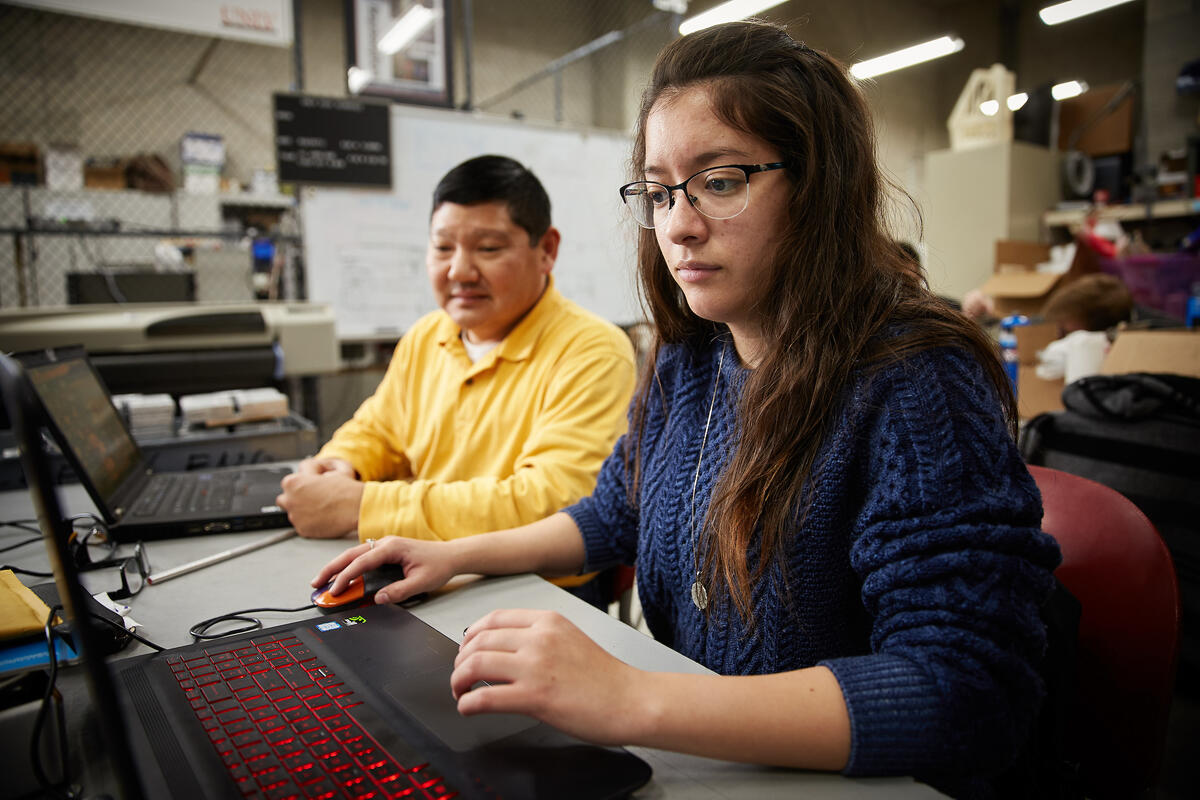In programming and technology, most professionals started as curious people who had somebody to feed that curiosity or inspire them to do something.
Jimmy Jacobson, the chief technology officer for remote software development company Codingscape, now helps to feed that curiosity for students in the IT Workforce Talent Pipeline program – a yearlong program funded through the Governor’s Office of Science Information and Technology (OSIT) – that gives Nevada high school juniors and seniors an opportunity to develop skills in information technology, computer science, and cybersecurity.
The program connects students to local job opportunities while teaching them skills around seeking and securing employment. It is produced in partnership with UNLV’s College of Education; College of Engineering; Center for Mathematics, Science, and Engineering Education; the National Institute for the Advancement of Education; Clark County School District schools; and city and business partners like Codingscape.
Jacobson founded Codingscape after noticing there often weren’t enough roles for software engineers in Southern Nevada, who either work remotely or end up leaving Las Vegas. It was important for the organization to provide mentorship to area high school students who are curious about the field but don’t have mentors to feed that curiosity.
“I’m so excited to be part of this program because this is exactly what’s needed here in Southern Nevada,” he said.
Xue Xing, the project’s lead and an associate professor of career-technical and postsecondary education in UNLV’s College of Education, called it the first and the most inclusive workforce talent pipeline program in the state with dual enrollment components for students who come from diverse backgrounds.
On top of networking opportunities with future employers, students in the program can end up with six college credits, one high school elective credit, and one industry credential of a student’s choice needed to be successful at obtaining a job or advancing their education.
Xing called the funding from the state “instrumental” in establishing the needed infrastructure to make the program successful in its first year, and for future cohorts.

This past spring, Xing, Jacobson, UNLV faculty, and community partners gathered at a Southern Nevada STEM network convening hosted by the governor’s office to celebrate the work being done in the field across Southern Nevada.
Lis Dziminski, OSIT’s STEM program manager, called the IT Pipeline project it game-changing for the community, students, and their families.
“Our grant funds going into programs like this are critical because the STEM industry needs qualified people to take the jobs that are out there,” she said. “This type of program is delivering that for the state.”
Roughly 100 students applied for the program in its inaugural year, and 29 high school students were ultimately accepted and enrolled. Of them, eight are female, 14 Hispanic, seven non-Hispanic minorities – specifically Black students – and two students were from rural areas, including one from Nye County.
Yingtao Jiang, associate dean for undergraduate programs at the College of Engineering, said the number of applications received during the short three-week application window is a testament to the demand for these types of programs in Southern Nevada.
“Everybody is telling the same story,” he said. “They want us to continue.”
In addition to visits to organizations like Codingscape and the Las Vegas Valley Water District, students have also been able to take computer science and employability skills classes through UNLV.
Angel Victoria Mendoza, a junior at College of Southern Nevada High School and one of the participating students, said he applied after seeing a flier advertising the program at his old high school.
The college credits – particularly the UNLV computer science class, which has prompted him to consider majoring in computer science in college – have been the obvious benefits, he said, in addition to having the workshops and credentials on his resume.
Mendoza said he would like to see more promotion of the program in the future, calling it a helpful metric for high school students to assess their interests before they get to college.
“Everyone should have this opportunity,” Mendoza said.
Jacobson, with Codingscape, called the talent coming out of CCSD and other schools in Southern Nevada “remarkable.” His company has committed to providing paid internships to enrolled students because they believe so strongly in the program.
“I’d encourage other businesses here in Southern Nevada to jump in and invest in the future of our ecosystem here and also encourage the Governor’s Office and the state to continue looking at how they can invest in helping bring businesses into this program too,” he said.
With the support from the state, UNLV has leveraged its unique resources to meet the community’s needs in regards to improving the STEM pipeline, but Jiang expressed the desire to continue expanding the corporate sponsors interested in partnering with the program.
“This opportunity should be extended to everybody. That’s my hope,” he said.
This article was produced in collaboration with the program's faculty, research, practitioner, and community partners and the National Institute for the Advancement of Education (NIAE), an interdisciplinary institute housed at UNLV's College of Education that engages in interdisciplinary research-practice-policy efforts that transform PK-20 education through innovation, excellence, evidence, and equity.



